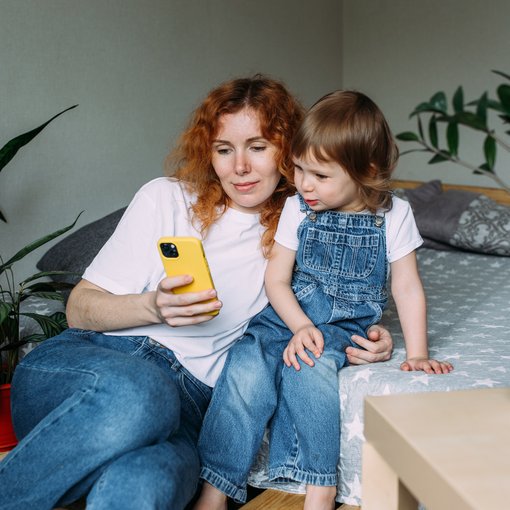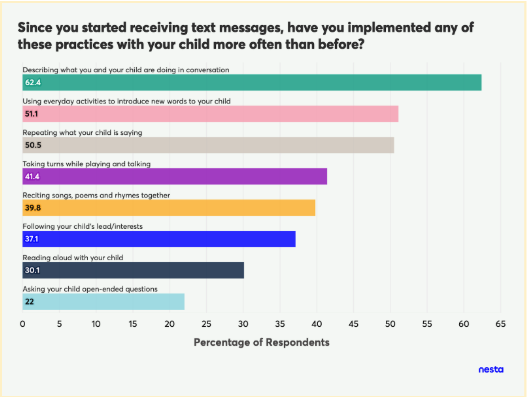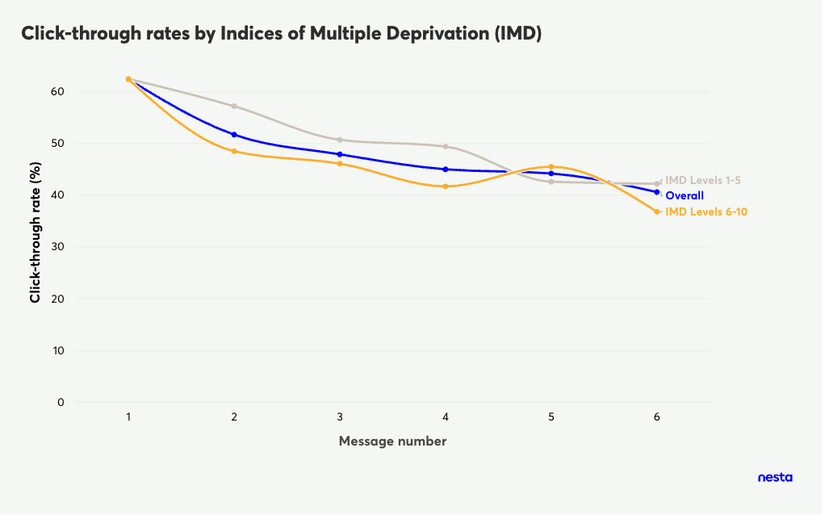
Parents experiencing socio-economic disadvantage tend to have low engagement with parenting support and information. These parents face a range of individual and systemic challenges when accessing parenting support. The challenges can be exacerbated by a lack of family and community networks. Parents of all backgrounds will often go online for support, but face overwhelm and a lack of reliable, relevant, and credible resources.
Online parenting programmes offer an opportunity to broaden parents’ access to support because they are relatively low-cost and parents can engage easily via a smartphone in their own home. Recent research found that 98% of parents in the UK with children under three have a smartphone and internet access with WiFi. Therefore there are now very few barriers to online access for the current generation of parents with young children.
However, innovation and research are not sufficiently keeping up with this opportunity. There is still a lack of scalable digital programmes in the UK that are proven to be effective in engaging parents from low-income backgrounds, as well as a gap in universal, preventative programmes. In analysis by Nesta, we found that of 135 parenting interventions surveyed, only 38 were found to be delivered digitally (i.e. over video call), with only four delivered via SMS or email.
Our work on digital parenting interventions gives us some insight into the potential value of digital parenting support. Online parenting programmes offer an opportunity to provide parenting support that is low-cost, on-demand, accessible, tailored, and non-stigmatising.
Early results are promising about how digital programmes could help expand the reach of parenting support and have an impact on children's development. At Nesta we have been working as an innovation partner with several organisations who are developing digital parenting interventions. Through these projects we have learned about how online support can best reach and engage parents, ensuring every child can have the same chance of developing to their full potential in the early years.
We have worked as an innovation partner across the following digital parenting programmes:
Through these partnerships, we’ve learned a lot about the increased accessibility provided by online parenting interventions, the ability to provide low-cost support and the attractiveness of an offer that can fit in with busy family routines.
Findings from our partnership with PEDAL to test implementation of the Playtime with Books programme demonstrated that online parenting support offers a way to address known issues parents face with accessing in-person support, such as cost, travel and geographic constraints and time commitments.
PEDAL interviewed parents who participated in the Playtime with Books programme to learn more about their experiences:
“...it meant I could fit it in when I wanted to do it…the online is a lot more flexible. It works for people with families and commitments…I think where my life is at the moment, online was better. I don't think I'd have been able to do it in any other kind of fashion”
Parent
Facilitators delivering the Playtime with Books programme also noted that the digital nature of the programme was a ‘selling point’ for parents:
“Digital was a real strength and selling point and the fact that parents can do it from their home, especially for single parents and those working in shifts.”
Service manager in a local authority
Some parents noted that this overcame access barriers they would have faced in engaging in other programmes, particularly for rural communities:
“I think it's a really good way of delivering this programme. As Shropshire is so rural, some of my visits I go to when I go to a school, I'm driving for an hour and a half to do an hour visit, so it's three hours travelling… for me, that's a huge learning point.”
Parent
“...with the library service getting cut, it’s a great way of increasing reach especially in rural communities”
Parent
Online parenting programmes, such as Triple P Online, can be delivered for about £100 per family, which is much cheaper than similar in-person programme Incredible Years Toddler which has a cost rating of 2 in the guidebook (£100 - £499). The Tiny Happy People texting programme, at our most recent estimate, costs only £3.40 per parent to deliver for the full 18-month period. This figure includes a cost per acquisition rate (£0.33) via paid social advertising, costs of sending a parent a text message every week for 18 months (including a few messages for replies and feedback), and online hosting costs per user.
The team at Nesta is continuing to explore ways in which we can bring down costs, for example in how we recruit users (some can be recruited for free or via embedded systems), the price of texts and hosting. As online parenting programmes can typically be delivered at much lower cost, they have the potential to be highly scalable.
Although online parenting support is low-cost, we have some early signals that it is a promising route towards helping parents to establish the behaviours that can most benefit their children.
Our partnership with Early Ideas Limited on the TANDEM project found in a very small-scale pilot that some ‘new reader’ caregivers who did not previously have a regular reading routine with their child reported an increase in shared reading after incorporating TANDEM into their routines. Some caregivers also reported that this, more frequent, shared reading experience fostered stronger bonds between them and their children.
On the Tiny Happy People text messaging project, we also have some early signals that the text messages may be leading parents to increase positive parenting behaviours. Encouragingly, a majority of the parents signed up to the text messaging programme who responded to our survey (n = 186) reported that they are implementing at least one key parenting behaviour more frequently since receiving text messages as part of the programme.

View this chart on the Nesta website
Bar chart showing parent responses to the question: since you started receiving text messages, have you implemented any of these practices with your child more often than before?
Describing what you and your child are doing in conversation - 62.4% said yes
Using everyday activities to introduce new words to your child - 51.1% said yes
Repeating what your child is saying - 50.5% said yes
Taking turns while playing and talking - 41.4% said yes
Reciting songs, poems and rhymes together - 39.8% said yes
Following your child's lead/interests - 37.1% said yes
Reading aloud with your child - 30.1% said yes
Asking your child open-ended questions - 22% said yes
While it is important to note that these survey responses are subjective and subject to social desirability bias, it is encouraging that parents are recognising the key messages of the programme and reporting increased implementation. This is a positive early signal for us that the Tiny Happy People texting programme could have a positive impact on the home learning environment and children’s outcomes.
Based on findings from these two projects, combined with existing robust evidence from programmes like Triple P online, we are seeing early signals that online interventions can have the desired effects on parenting behaviours and the home learning environment that are associated with improved child outcomes.
While challenges remain, initial findings regarding digital parenting interventions are promising, and Nesta’s fairer start team has identified a clear path forward based on what we've learned. Key obstacles that we are keen to address include improving engagement and retention in online programmes, particularly within priority groups of parents.
Findings from the Playtime with Books programme demonstrate that engagement and retention with online programmes can still be a challenge. Our recent implementation pilot of Playtime with Books showed that parents disengaged at different stages and for different reasons. The reasons for parents dropping out of the programme included:
For some parents, we speculate that facilitators’ engagement with the programme (or lack thereof, considering difficulties with the prototype online platform) may also have had an impact on parent engagement. However, even with all of these reasons taken into account, parents’ engagement and completion of the Playtime with Books programme seems to have been roughly comparable with other similar parenting programmes that have been evaluated.
Engagement rates for priority (lower-income parents) in our Tiny Happy People pilot were promising, with parents living in more deprived areas who initiated the programme having similar engagement rates to those in more affluent areas. Parents in IMD deciles 1-5 (our target group) clicked on links to watch Tiny Happy People videos at a similar rate to parents in IMDs 6-10. These encouraging levels of engagement from parents in IMD deciles 1-5 suggests that the text messages and videos we are sending to them are relevant enough to keep them interested.

View chart on Nesta website
Line graph showing the changes to click through rate depending on the number of messages sent.
The x-axis is labelled Message number and ranges from 1 to 6. The y-axis is labelled Click-through rate (%) and ranges from 0 to 60.
There are three lines on the graph, each representing a different group:
However, we still have work to do to establish the best ways to recruit parents from lower-income backgrounds to participate in the programme in the first place.
Online parenting interventions offer a significant opportunity to address common challenges of access, time constraints and cost faced by parents in accessing parenting support, particularly those from low-income backgrounds.
Our innovation partnerships piloting interventions including Playtime with Books, the Tiny Happy People text messaging programme, and the TANDEM app demonstrate the potential for online programmes to offer increased access to low-cost interventions which could have a positive impact on parenting behaviours.
While we still have a lot to learn about how to boost engagement and retention by parents from lower-income households, the early signals are promising and we can use innovative approaches to test and iterate solutions and ensure that programmes meet the needs of parents.
In future work on online parenting support, continued focus on addressing barriers, further reducing costs and tailoring programmes to families’ specific needs to boost engagement will be critical to maximizing their impact at scale.
Catch up on our online discussion exploring how online parenting interventions can help close the early years disadvantage gap
